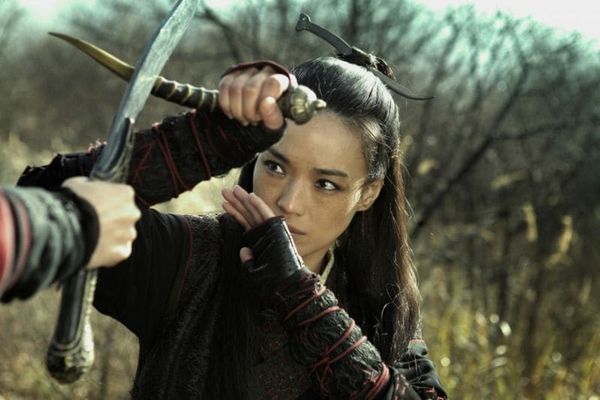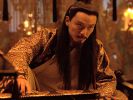Eye For Film >> Movies >> The Assassin (2015) Film Review
The Assassin
Reviewed by: Anne-Katrin Titze

The earliest known version of Cinderella, that includes a shoe and a fish, dates back to 9th century China. Hou Hsiao-hsien's outstandingly beautiful martial arts tale, The Assassin (Nie Yin Niang), based on the Tang Dynasty chuanqi, titled Nie Yinniang, an ancient short story by Pei Xing, takes place during the same century and although it is hardly a Cinderella story, magic is never far. Two donkeys from the prologue, shot in black and white like Dorothy's Kansas on an enchanted Chinese hill by a tree, have something to tell about the times at the end of the Tang Dynasty. It is in their eyes. Robert Bresson's Au Hazard Balthazar may come to mind. History breathes fire and humans are cruel. They bury each other alive and practice ruthlessness.
This is the story of Nie Yinniang (Shu Qi), who returns to the province of Weibo after having been abducted as a little girl and trained by a nun, Jiaxin (Sheu Fang-yi) for many years as an assassin. She masters the sword like no other, but her head and heart are not free of pity yet.

Yinniang is unable to kill a father while she sees him playing with his son who is chasing a butterfly. "First kill the one he loves, then the target himself," is the nun's advice. To learn to overcome her hesitance, Yinniang is sent back to her old home to assassinate the Governor of Weibo, Lord Tian (a fantastic Chang Chen). Lord Tian is not only her cousin, Yinniang, was also promised to him in marriage at age 15, in order to keep good relations between the province of Weibo and the Imperial Court.
Her conflict resembles that of Hans Christian Andersen's Little Mermaid, who, dagger in hand, has to decide between the beloved man's fate or her own immortal soul. In a fascinating sequence, she watches her former betrothed from behind gauze curtains, fluttering in and out of focus. The cinematography by Mark Lee Ping Bing is hypnotising and the rhythm of the images perfectly in tune with the landscapes we are offered to devour with our eyes. The birch forest shimmers, a family of goats chews and snuggles close together, children play in a timeless garden in front of a house that could almost have been arranged there by Frank Lloyd Wright.
The production and costume design by Huang Wen-ying combine historical accuracy with a revelation of detailed splendour, from the sturdy and elegant construction of roofs to the rope that ties the embroidered silk pouch holding two vitally important pieces of political jade - not a facet seems un-thought through, not a crimson saddle trim out of place.
Hou Hsiao-hsien, winner of the Best Director award at this year's Cannes Film Festival, transcends the wuxia genre and transports us into a land once upon a time that is charged with stillness and light and populated by women who take action, as if it were the most natural thing in the world, because it is. Shu Qi's movements are fantastic, her leaps nimble like a cat's, her landings on the ground without a sound.
The power of telling a tale should not be underestimated. The story of the King's bluebird takes a prominent spot as the film's format literally widens. The bluebird doesn't sing for three years, the story goes, and it is suggested to the king to place the bird in front of a mirror so that it has company. The bluebird sees itself, dances and, out of sadness, expires. It is for us to come up with the images for the tale. A metal mirror, polished and shown to village children in a much later scene is the only visual reference. Our imagination is triggered to do some work.
Details capture the senses. Three pomegranates on a table already make them the forerunner as fruit of choice for this year's New York Film Festival. (Michael Almereyda's Experimenter also features the biblical snack as reference). A concubine in the palace, Huji (Hsieh Hsin-ying), might be pregnant and we see how gossip spreads before smoke seems to rise from her body. A man whose impressively long white eyebrows merge with his equally impressive wizard beard, tears paper puppets from sheets in a kind of voodoo ceremony to scare lesser men.
Hou Hsiao-hsien not only reveals an order, a code of behavior as the genre suggests, he goes straight to the heart, that "to overcome human sentiment," might not be so essential after all.
The London Film Festival will be screening The Assassin this autumn and Wong Kar Wai, Artistic Director for The Metropolitan Museum of Art's China: Through The Looking Glass, chose a clip from Hou Hsiao-hsien's Flowers Of Shanghai to include in the exhibition that runs now through September 7, 2015.
Reviewed on: 02 Sep 2015















